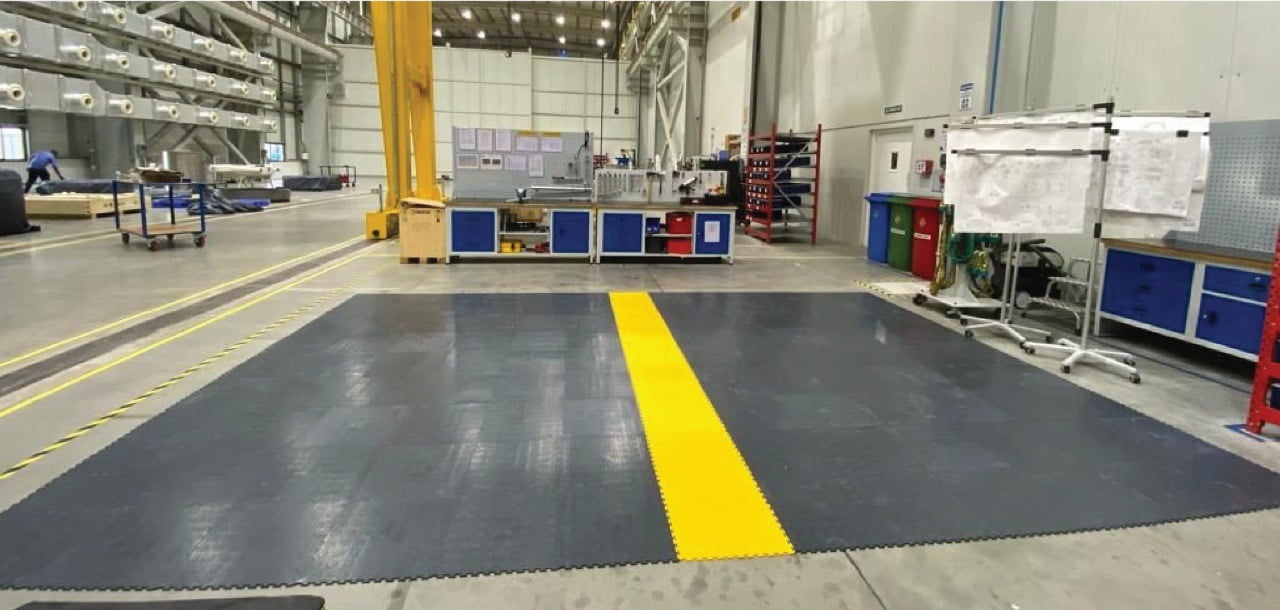Fire Safety and PVC Tiles: Understanding the Limiting Oxygen Index (LOI)
Fire Safety and PVC Tiles is a critical concern in both residential and industrial settings. One key aspect of fire safety for materials like PVC floor tiles is their Limiting Oxygen Index (LOI). This article, brought to you by Camp Manufacturing, explores the concept of LOI, its importance in fire safety and PVC tiles meet these crucial safety standards.
Understanding the Limiting Oxygen Index (LOI)
The Limiting Oxygen Index (LOI) is a crucial parameter in evaluating the flammability of materials, particularly in the context of building and construction materials like PVC tiles. It quantifies the minimum concentration of oxygen needed to sustain the combustion of a material under specified testing conditions.
LOI Measurement Details: A material’s LOI is measured in a controlled environment using a specialised apparatus. During this test, the material is subjected to varying oxygen and nitrogen concentrations until the minimum oxygen concentration required to sustain combustion is determined.
For example, if a material’s LOI is 25%, it needs an atmosphere with at least 25% oxygen to keep burning. Since Earth’s atmosphere is approximately 21% oxygen, a material with an LOI higher than this is less likely to support combustion in normal conditions.
The Critical Role of LOI in Fire Safety and PVC Tiles
Evaluating Fire Hazards: The LOI assists in gauging the fire hazard of materials. Materials with a high LOI are considered safer as they are less prone to ignite and sustain a flame, making them ideal for use in various settings where fire safety concerns.
Guiding Material Selection: In environments where fire risk needs to be minimised, such as public buildings, industrial settings, and residential areas, selecting materials with a high LOI can be a crucial aspect of fire safety planning.
Fire Safety and PVC Tiles and LOI Compliance
Composition and Natural Fire Resistance: PVC tiles inherently have a higher LOI than many other materials used in flooring. This characteristic is mainly due to chlorine in PVC, which imparts natural fire-retardant properties to the tiles.
Enhancement Techniques at Camp Manufacturing: At Camp Manufacturing, we further enhance the fire resistance of PVC tiles. Through specialised manufacturing processes and the incorporation of fire-retardant additives, we ensure that our PVC tiles not only meet but often exceed the required LOI safety standards.
Adhering to Testing Standards: To accurately determine the LOI of our PVC tiles, we adhere to stringent testing protocols like ASTM D2863. This standard outlines the method for measuring the minimum oxygen concentration needed to support candle-like combustion of plastics.
Applications in Various Environments
Suitability for Safety-Critical Areas: Owing to their higher LOI, PVC tiles from Camp Manufacturing are particularly suitable for environments where fire safety and PVC tiles is paramount. This includes industrial facilities where fire risks may be higher due to the nature of operations. These commercial buildings require adherence to strict fire codes, and residential complexes where safety is a primary concern.
Beyond Fire Resistance: While the high LOI of our PVC tiles makes them an excellent choice for fire safety, it’s also important to note that these tiles offer additional benefits such as durability, ease of maintenance, and aesthetic versatility, making them an all-around efficient choice for various flooring needs.
Conclusion
The Limiting Oxygen Index is more than just a measure; it’s a vital safety criterion, especially for materials like PVC tiles used extensively in construction and interiors. At Camp Manufacturing, our commitment to safety and quality is reflected in our focus on producing PVC tiles with optimal LOI values, ensuring that our products are aesthetically pleasing and durable and adhere to the highest fire safety standards.
Frequently Asked Questions (FAQs)
1. How does Camp Manufacturing ensure the fire safety of its PVC tiles?
At Camp Manufacturing, fire safety is a top priority. We ensure the fire safety of our PVC tiles by enhancing their Limiting Oxygen Index (LOI) through specific manufacturing processes and additives. Our tiles undergo rigorous testing, including adherence to ASTM D2863 standards, to guarantee that they meet high fire-resistance requirements. This makes our PVC tiles suitable for use in environments where fire safety is critical.
2. Can PVC tiles from Camp Manufacturing be customised for specific industrial applications?
Absolutely. We specialise in tailoring Fire Safety and PVC Tiles to meet specific industrial needs. Whether adjusting the hardness level for different industrial environments or customising the size and colour, our team at Camp Manufacturing works closely with clients to provide tiles that meet their precise specifications and application requirements.
3. What measures does Camp Manufacturing take to ensure the durability of its PVC tiles?
Durability is key in our PVC tiles. We conduct thorough tests to measure essential properties such as tensile strength and specific gravity, ensuring our tiles can withstand various stressors like heavy foot traffic and mechanical loads. Our production process also includes quality checks to ensure the tiles are durable and maintain their aesthetic appeal over time.
4. How does the specific gravity of PVC tiles impact their application in different settings?
The specific gravity of PVC tiles, a key focus at Camp Manufacturing, determines their density and suitability for different environments. A higher specific gravity implies more excellent durability, making these tiles ideal for high-traffic industrial areas. Conversely, tiles with a lower specific gravity might be more suitable for residential or light commercial use where flexibility and comfort are essential.
5. What are the advantages of using PVC tiles with varying hardness levels in different spaces?
The hardness of PVC tiles, ranging from 70 to 95 on the Shore A scale, is crucial in tailoring them to specific spaces. At Camp Manufacturing, we offer tiles with different hardness levels to suit various applications: more intricate tiles for heavy-duty industrial use, medium hardness for commercial spaces, and softer tiles for residential areas. This versatility ensures that our clients receive a flooring solution that offers the right durability, comfort, and safety balance for their specific environment.

